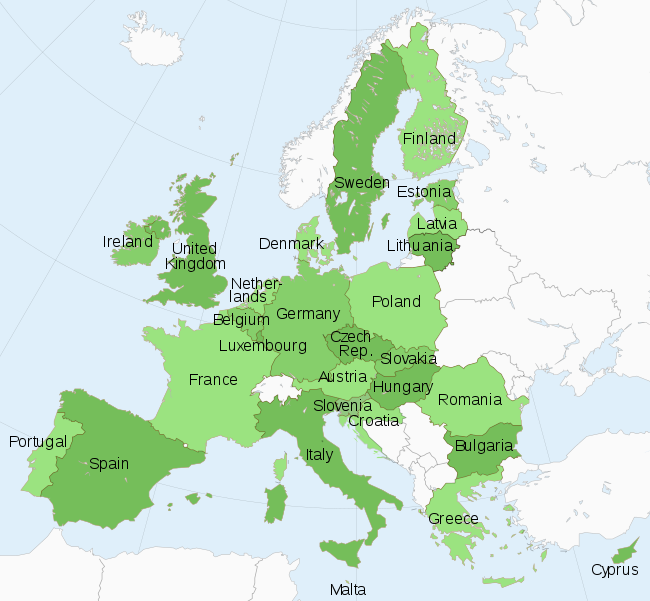The European Union is a political and economic union with twenty-eight member states, most of which are located in Europe. “The EU has developed an internal single market through a standardized system of laws that apply in all member states. EU policies aim to ensure the free movement of people, goods, services, and capital within the internal market, enact legislation in justice and home affairs, and maintain common policies on trade, agriculture, fisheries, and regional development.” Wikipedia
The EU has the European Parliament and the Council of the European Union that work on legislation for the Union. The European Commission is the executive branch responsible for the management of the EU (EC). It also has the Court of Justice of the European Union (ECJ) that adjudicated legal disputes between the member nations.
Some nations in the EU such as the U.K. and France are committed to nuclear power while other members such as Luxembourg and Austria are strongly opposed to the use of nuclear power in the EU. In 2015, Austria filed a law suit in the ECJ against the decision of the European Commission to allow new UK state subsidies for the Hinkley Point C project. The Commission said that the construction of new nuclear power reactors at the Hinkley Point power plant would be a “objective for common interest of the members of the EU.” Luxembourg supported Austria in the suit which should be decided sometime this summer.
Now Austria is mounting a legal challenge to the Commission’s support for an expansion of the Paks nuclear power plant in Hungary with construction contracted to the Russian company Rosatom. Once again, Luxembourg is supporting Austria in the ECJ. The two EU members want to gather more EU members into an alliance to counterbalance what they see as blank approval by the EC of state subsidies for nuclear power plant projects in the EU.
Some member nations in the EU see the Hungarian project as an example of the Hungarian Prime Minister moving closer to Russia in economic matters. The Commission gave final approval for the project a year ago after Budapest promised to “limit distortions in competition.”
Austria's minister for sustainability, agriculture and tourism said, “I am very pleased that Luxembourg is joining the complainants with regards to the extension of the Paks nuclear plant and is joining us in court proceedings. This strengthens our position. Further action will be taken at European level. It is important that no one invests public money into nuclear energy, because it is certainly the wrong way if they want to achieve climate protection goals.”
With respect to an anti-nuclear alliance, the Austrian minister said, “We have great hopes for the new German coalition. In the coalition agreement, they also say that no state aid should be granted to build nuclear power plants. On Wednesday, I'll meet Frau [Barbara] Hendricks [German minister for environment and nuclear safety] in Berlin and we will talk about this topic.”
The Luxembourg minister of the environment said that the two countries wanted to stop the “renaissance of nuclear energy”. She went on to say, “It is important that no one invests public money into nuclear energy, because it is certainly the wrong way if they want to achieve climate protection goals.”
The head of the European Commission said last year that the EC would publish a “communication” on the future of the Euroatom treaty by the summer of 2018. Hopefully, the EU will be able to work out a nuclear policy that is more acceptable to all EU members.
Members of the European Union:
